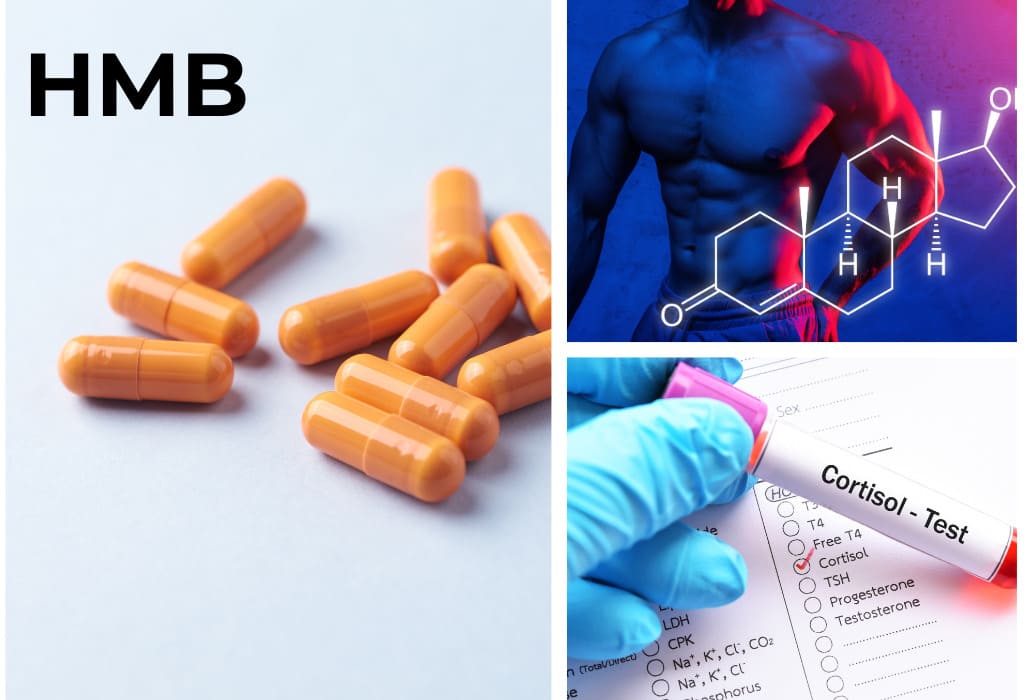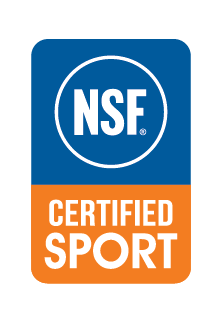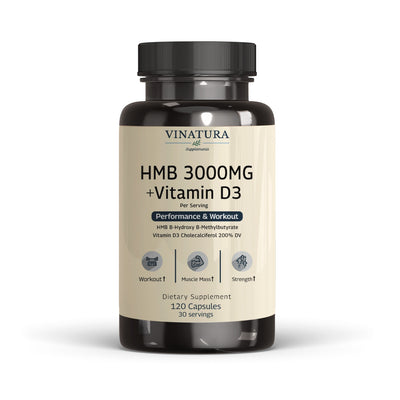
Does HMB Increase Testosterone And Cortisol Concentration?
This article will explore whether HMB increases testosterone and cortisol concentrations.
With the growing interest in the role of HMB in improving training performance and muscle recovery, understanding its effects on hormones such as testosterone and cortisol is crucial.
Let's delve into and consider the benefits of HMB through this article.
Before exploring further, please read the disclaimer located at the end of this webpage.
Does HMB Increase Testosterone?
According to scientific studies, HMB may increase testosterone levels, especially in athletes, during combined aerobic and anaerobic exercises. However, more research is needed to confirm these results (1).
HMB helps reduce protein breakdown, protecting muscles from depletion during intense training by decreasing the activity of specific catabolic pathways in the body.
This indirectly supports maintaining testosterone levels by reducing the need for these pathways to support protein breakdown. However, this relationship depends on various factors and needs more explicit evidence.
Also, stress can lead to increased cortisol, a hormone inhibiting testosterone production. HMB may help reduce cortisol, creating a favorable environment for testosterone production.
So, how does HMB affect cortisol? Let's find out in the following content.
Does HMB Impact Cortisol Concentration?

Synthesis and analysis of data suggest that HMB may help reduce cortisol levels after strength training, such as weightlifting, muscle group training, or aerobic exercise (2).
Cortisol is a steroid hormone produced by the adrenal glands in humans and other animals. It's often called the "stress hormone" because it rises in stressful and fatigued situations.
Moreover, cortisol is a hormone that can stimulate protein breakdown to provide energy for the body.
However, HMB inhibits protein breakdown and promotes protein synthesis, helping muscles avoid stress during excessive workouts, thereby reducing the need for cortisol production.
During high-intensity training, the body may experience stress and require protein breakdown to provide energy, producing cortisol to stimulate this breakdown.
However, HMB inhibits this breakdown and promotes protein synthesis, helping muscles recover from fatigue or limiting stress during training. When no stress or fatigue requires protein breakdown, cortisol will have no reason to be produced.
Therefore, HMB indirectly helps reduce cortisol levels.
Benefits of HMB Effects on Testosterone and Cortisol for Human Health
The effects of HMB on testosterone and cortisol offer several benefits for human health. Below are some of the benefits:
Enhanced Strength and Muscle Mass

HMB has been shown to increase muscle mass in individuals aged 65 and older at high risk of muscle loss or malnutrition in old age. HMB supplementation may be beneficial in preventing muscle wasting due to bed rest or other factors (3).
Improved Training Performance
HMB helps increase testosterone levels, leading to improved endurance and muscle recovery.
This results in higher training performance and reduced risk of injury. When cortisol levels decrease, individuals training at higher intensities are less likely to experience fatigue and exhaustion.
However, some studies suggest insufficient evidence to prove that HMB supplementation in younger individuals improves strength and training performance (6).
Those considering HMB supplementation should approach it cautiously and consult with experts.
Explore other HMB's benefits in this video:
How Does HMB Increase Testosterone?
Cortisol is a stress hormone released from the adrenal cortex in response to both psychological and physical stress.
After a specific exercise duration, cortisol levels spike during the initial recovery period. This prompts the process of protein breakdown.
Another study by Knitter found that HMB acts more as an anti-catabolic rather than an anabolic agent by indicating that HMB may reduce muscle damage markers such as creatine phosphokinase and lactate dehydrogenase, leading to lower cortisol levels.
The ability of HMB to reduce cortisol levels consequently impacts protein synthesis, which aids in increasing testosterone.
How to Use HMB to Increase Testosterone Effectively?

It's important to adhere to dosage and administration and understand its combination with other supplements or activities to maximize the effectiveness of using HMB to increase testosterone.
Regarding dosage, there isn't a fixed dose for a specific individual. However, research has shown that using HMB at a dosage of 3 grams combined with creatine has significantly improved strength and workout performance.
Some supplements that can be considered include Zinc, Vitamin D, Magnesium, DAA (D-aspartic acid), and Fenugreek. However, before using any combination, it's advisable to consult with a doctor or healthcare professional to ensure safety.
HMB can be taken in various forms, but powder and capsules are the easiest.
Powdered HMB is easily soluble and can be mixed with fruit juice or smoothies for quick absorption. Additionally, powdered form is often more cost-effective than capsules.
However, HMB in capsule form is convenient to carry and use. It also allows for better control of dosage.
Conclusion
In conclusion, although HMB has potential health benefits for humans, especially males, there isn't enough scientific evidence to confirm its direct impact on testosterone and cortisol levels.
Therefore, to use HMB effectively, it's essential to research thoroughly and consult with experts.
References
- [1] Zhao, L., & Mohammad, M. (2022). Testosterone and cortisol responses to ß‐hydroxy ß‐methylbutryate consumption and exercise: A meta‐analysis. Food Science and Nutrition, 10(9), 2815–2824. https://doi.org/10.1002/fsn3.2887
- [2] Gang, L. (2020). Effects of β-hydroxy β-methylbutryate (HMB) supplementation on testosterone and cortisol concentration of athletes: A systematic review and meta-analysis of randomized controlled trials. Authorea (Authorea). https://doi.org/10.22541/au.160218200.00176233/v1
- [3] Wu, H., Xia, Y., Jiang, J., Du, H., Guo, X., Liu, X., Li, C., Huang, G., & Niu, K. (2015). Effect of beta-hydroxy-beta-methylbutyrate supplementation on muscle loss in older adults: A systematic review and meta-analysis. Archives of Gerontology and Geriatrics, 61(2), 168–175. https://doi.org/10.1016/j.archger.2015.06.020
- [4] Zhao, L., & Mohammad, M. (2022). Testosterone and cortisol responses to ß‐hydroxy ß‐methylbutryate consumption and exercise: A meta‐analysis. Food Science and Nutrition, 10(9), 2815–2824. https://doi.org/10.1002/fsn3.2887
- [5] Julen Fernández-Landa, Calleja-González, J., Patxi León-Guereño, Caballero-García, A., Córdova, A., & Mielgo-Ayuso, J. (2019). Effect of the Combination of Creatine Monohydrate Plus HMB Supplementation on Sports Performance, Body Composition, Markers of Muscle Damage and Hormone Status: A Systematic Review. Nutrients, 11(10), 2528–2528. https://doi.org/10.3390/nu11102528
- [6] Wilson, G. J., Wilson, J. M., & Manninen, A. H. (2008). Effects of beta-hydroxy-beta-methylbutyrate (HMB) on exercise performance and body composition across varying levels of age, sex, and training experience: A review. Nutrition & Metabolism, 5(1). https://doi.org/10.1186/1743-7075-5-1
Author

Product Disclaimer
Including an ingredient or study does not evaluate, endorse, or recommend any Vinatura product or any third-party product. Some ingredients discussed may not be used in any Vinatura product.
The content of the articles has not been evaluated by the Food and Drug Administration (FDA) and is not intended to promote or endorse any specific product. Any products sold on this website are not intended to diagnose, treat, cure, or prevent any disease.
Opinions and Endorsements
Any claims, statements, or opinions expressed in the articles are those of the author(s) and do not necessarily reflect the views or opinions of the manufacturers of the dietary supplement products. The products sold on this website are separate from the content of the articles and are not directly endorsed or associated with the information presented here.
Liability Disclaimer
The author(s) of the articles, website, and manufacturers of the dietary supplement products do not assume any liability for any potential consequences arising from the use of the information provided in the articles. Ingredient effects, dosages, and safety vary by individual, formulation, and context; some ingredients interact with medications or may be unsuitable during pregnancy or lactation. It is recommended that individuals consult with a qualified healthcare professional before making any dietary or lifestyle changes, including the use of dietary supplements.
Product Usage
Please refer to the product labels and packaging for specific usage instructions and guidelines for the dietary supplement products sold on this website.
Customer Support
For any concerns or questions regarding the dietary supplement products, please contact our customer support team, who will be more than happy to assist you.






Leave a Comment
Be the first to comment.
What do you think?